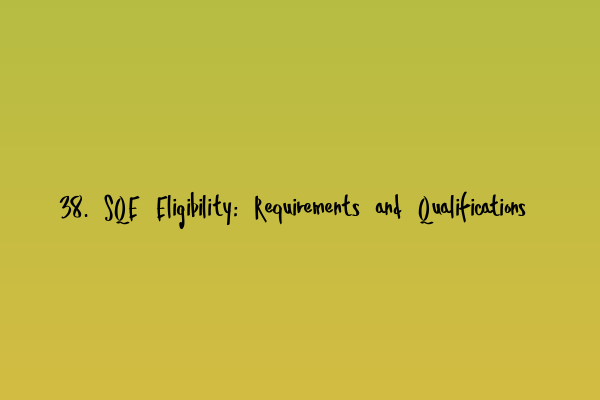38. SQE Eligibility: Requirements and Qualifications
Are you considering a career in law and want to know if you are eligible to take the Solicitors Qualifying Examination (SQE)? Look no further! In this article, we will discuss the requirements and qualifications you need to meet in order to be eligible for the SQE.
1. Educational Requirements
The first and most important requirement for the SQE is having a qualifying law degree or an equivalent qualification. This means that you must have a law degree from a recognized university or an overseas equivalent that is recognized by the Solicitors Regulation Authority (SRA).
If you don’t have a qualifying law degree, don’t worry! You can still qualify for the SQE by completing the Equivalent Means route. This route allows individuals with non-law degrees or non-UK qualifications to demonstrate their legal knowledge and skills through an assessment process.
Related Articles:
- Workshops and Seminars on Criminal Practice: Expanding Your Expertise
- Mastering MCQ Strategies for SQE Criminal Law: Conquer the Exam
- Updates in UK Criminal Laws: Staying Informed and Prepared
- Prepare for SQE Criminal Law 2023: The Ultimate Guide to Success
- Burden of Proof in Criminal Law: Unraveling Legal Responsibility
2. Character and Suitability
In addition to educational requirements, the SRA also assesses the character and suitability of individuals applying for the SQE. This means that you must be of good character and meet the suitability criteria set by the SRA.
The character and suitability assessment includes factors such as criminal convictions, bankruptcy, and disciplinary actions. It is essential to provide accurate and honest information about your background and any relevant circumstances.
Furthermore, it is important to note that the SRA may conduct further checks, including the requirement to disclose any relevant criminal convictions or disciplinary action during the application process. Failure to disclose such information may result in disqualification from the SQE.
3. English Language Skills
Proficiency in English language is a fundamental requirement for practicing law in the UK. As such, the SRA requires individuals taking the SQE to have a good command of the English language.
If English is not your first language, you may need to provide evidence of your English language proficiency. This can be done through providing proof of your qualifications in English or by taking an approved English language test.
Related Articles:
- Workshops and Seminars on Criminal Practice: Expanding Your Expertise
- Mastering MCQ Strategies for SQE Criminal Law: Conquer the Exam
- Updates in UK Criminal Laws: Staying Informed and Prepared
- Prepare for SQE Criminal Law 2023: The Ultimate Guide to Success
- Burden of Proof in Criminal Law: Unraveling Legal Responsibility
4. Work Experience
Another requirement for the SQE is gaining work experience in a legal environment. This is to ensure that candidates have practical exposure to the legal profession and can apply their theoretical knowledge effectively.
Work experience can be gained through various means, such as internships, placements, paralegal roles, or working at a law firm. The duration and quality of the work experience may vary, but it is important to have a substantial understanding of the legal practice.
The SRA may require you to provide evidence of your work experience, including reference letters from legal professionals or employers. It is essential to keep a record of your work experience and obtain appropriate documentation to support your application.
5. Fitness to Practice
The final requirement for the SQE is demonstrating fitness to practice law. This assesses your physical and mental health to ensure that you are capable of carrying out the responsibilities of a solicitor.
If you have any physical or mental health conditions, it is important to disclose them to the SRA. They will consider your circumstances and may request additional information or assessments to determine your fitness to practice.
Congratulations! You have now learned about the requirements and qualifications for the SQE. If you meet these criteria, you can start preparing for the examination and embark on an exciting career in law.
Related Articles:
- Workshops and Seminars on Criminal Practice: Expanding Your Expertise
- Mastering MCQ Strategies for SQE Criminal Law: Conquer the Exam
- Updates in UK Criminal Laws: Staying Informed and Prepared
- Prepare for SQE Criminal Law 2023: The Ultimate Guide to Success
- Burden of Proof in Criminal Law: Unraveling Legal Responsibility
